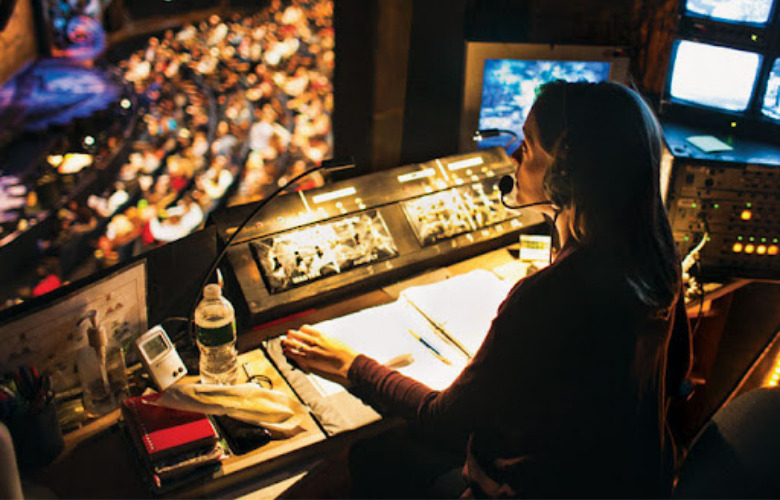
In this second part, Dave, Hope, and Anna discuss the situation after Covid, getting into Broadway, the pressure of high expectations on stage managers – exerted by themselves and others, and SM working hours.
Dave: Not yet, but SMs are not coming back in the numbers the industry was expecting. Many found other employment and are sticking with that.
So, we might gradually see the generation of folks who are willing to take low-paid jobs not being there anymore.
This may just shift the entire SM landscape for everyone else.
Currently, in the USA, some of the intern and Production Assistant (PA) positions are not being filled as quick as the producers thought they would be. Thus, they will have to invest more to get their teams together.
Dave: The Actor’s Equity Association has recently announced opportunities for international stage managers to join unionized productions.
Historically, there was a lot of union activity about stopping non-US citizens from working on Broadway.
A lot of this had to do with the feud between the US and the UK. For example, when productions like Miss Saigon came over to the US, they wanted to keep their own teams and were reluctant to replace them with Americans.
It is a political issue about quotes. Globalization helped a bit already. Now Covid19 brings new circumstances as well. Things are slowly opening up. But the job market in the US was locked down for outsiders to such an extreme that even with a gradual opening, the job market is still not open.
Anna: The interesting thing I have experienced in multiple realms of stage management in shows around the world is that there has never been a lot of patience for SMs to learn.
For example, I’ll bring stage managers to The House of Dancing Water, a large-scale aquatic circus show in Macau.
Realistically, it takes 6 months for an SM to wrap their head around that show because it is so complex. Especially, if they have had no large scale acrobatic and automation experience before.
They may be a great SM, but they must learn new elements they weren’t aware of before.
Pretty quickly, you’ll hear performers backstage saying to the new SM team member, “Why haven’t you learned this track yet?”
And I want to ask the performers, “Do you realize that when you came here, we gave you 3 months before we put you in the show? That was you learning. I need my team to have the time to learn, too. Cut them some slack.”
Even when the new SMs know the track, they’ll still need to learn a lot about the show-specific safety procedures, line-up, scheduling, etc.
There is a lot of expectation for SMs to come in and just instantly be at the top of their game. There isn’t a lot of tolerance.
And, sometimes, if the show isn’t put well together it can be hard to grasp things quickly.
Dave: In the USA, 10 out of 12 is limited to technical rehearsal weeks onstage.
(The term “10 out of 12” refers to, by Equity union standard, a 12-hour rehearsal day in which a maximum of 10 hours can be spent working on lights, sound, costumes, and other technical elements.)
In a regular show working week there is no one size fits all.
I’ve seen as low as a 30-hour week to as high as 48 hours before you get to tech. During tech it’ll climb up to 50 or 60 hours for rehearsals.
As an SM, add 2 hours plus each day, so we are looking at 65 up to 72 hours per week.
Dave: No. (laughs)
Hope: Just this week, I had an experience where tech got delayed more and more due to heavy rain.
Then the rain stopped, and we ended up with a 12-hour day during which stage management even worked through the meal break. All because it was decided last minute to go through the preview.
We do get overtime in situations like this. But it should be pre-approved when circumstances allow.
Dave: These are the situations when I’ve seen overtime compensation:
1) If you are working with a government entity and you suddenly fall under their supervision.
2) Emergencies.
Anna: At The House of Dancing Water in Macau, the technical departments had overtime after a certain number of hours.
But the SM contracts were particularly written so that overtime was already included in the base salary.
Our default position as stage managers is we do what needs to be done to get the job done. And we put ourselves last in many situations where, if it’s to get a show up and running, we will miss the lunch break, and work long days.
Dave: I would say we have this sense that we’ve always got to have our finger on the pulse of the production.
This often leads to us being present more than we might need to be.
I struggle not being present for all that is happening, because I want to stay on top of everything all the time.
Anna: Yes, because you know the more you know, the better you are going to be able to make the necessary decisions on a day-to-day basis.
Hope: It goes towards the urgency that was instilled in us in our profession. Hopefully, nowadays the educational institutions are introducing healthier practices for the next generation of SMs.
Anna: Stage management also attracts people with a particular kind of facilitator mentality.
There is an innate sense of urgency in people who work for live entertainment. A deadline is a deadline. Not to be moved. No discussion.
It is quite amazing, and we cannot underestimate and undervalue people who are wired like that. We will find a way. We will get the job done. No matter what.
When I left the theatre in Macau, I began working in more of an installation role with a digital agency in Hong Kong. I stayed with them for 2 years.
I remember one time we did an installation in Saud Arabia, and something couldn’t be imported in time. The instant reaction of my co-workers was, “Ah, no problem, we’ll just move the deadline.”
Whereas I was like, “No. We can change this or that and still deliver the installation on time.” But no one, except for me, was concerned about meeting the deadline.
Dave: The flip side of this can be that sometimes when opening night is coming it can be the saving grace. No matter what, we are going to open, and we will be done.
There is a great satisfaction in that. A collective pride. And a relief.
I cannot imagine what I would do if deadlines would keep changing…
If you missed part 1, just click here.
Official Website of the SMA Stage Managers Association.
The SMA International Cohort page.
Dave McGraw, Hope Rose Kelly, and Anna Robb are all experienced entertainment professionals.
Dave has enjoyed a varied career in Arts Entrepreneurship
and Stage Management. Since 2017, he has served as the Program
Coordinator for the thriving Arts Administration program
at Elon University.
Hope is an Equity Stage Manager based in the Berkshires.
She has worked at many companies in the Northeast and
across the Unites States.
Anna is Co-Founder and Managing Director for TheatreArtLife.
She is an experienced Producer/Production Stage Manager.
Her 20-year work history spans Asia Pacific, the Americas, Africa,
the Middle East and Europe.
Keep Your Cool Backstage as a Stage Manager: 12 Insights
Don’t Wear That Hat: Theatre Superstitions and Their Origins


Liam Klenk was born in Central Europe and has since lived on four continents. Liam has always been engaged in creative pursuits, ranging from photography and graphic design, to writing short stories and poetry, to working in theatre and shows. In 2016, Liam published his first book and memoir, 'Paralian'.
Read Full Profile© 2021 TheatreArtLife. All rights reserved.

Thank you so much for reading, but you have now reached your free article limit for this month.
Our contributors are currently writing more articles for you to enjoy.
To keep reading, all you have to do is become a subscriber and then you can read unlimited articles anytime.
Your investment will help us continue to ignite connections across the globe in live entertainment and build this community for industry professionals.